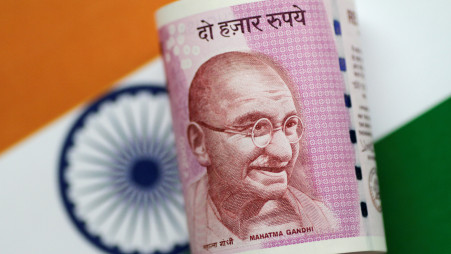Why rupee trade with India fails to get momentum
Businesses see the method as not viable for them as exports to India are much lower

More than a year after the introduction of a new trade mechanism to settle payments in Indian rupees instead of US dollars, the initiative has failed to gain significant traction as businesses find it not feasible.
Transaction statistics in the new method, introduced in July 2023, indicate that business conducted in Indian currency has been very insignificant.
According to data from the central bank, from 11 July 2023 to 10 September 2024, Bangladesh exported goods worth Rs33.08 million to India, while imports from India during the same period amounted to Rs21.02 million.
The total trade in Indian rupees amounts to less than $1 million when converted to USD. In contrast, Bangladesh exported goods worth $2.02 billion and imported nearly $14 billion from India in fiscal year 2023-24. The figure indicates that there was a scope to settle at least $2 billion worth of exports in rupees each year. However, this has not been possible due to a lack of interest from businesses.
Ali Reza Iftekhar, managing director and CEO of Eastern Bank, told TBS, "There is a trade imbalance of $12-12.5 billion between our imports and exports with India. After the initiation of trade in rupees, it has not progressed as expected due to various reasons, such as the lack of interest from businesses and import restrictions.
"Many businesses, even if they export to India, need to import from other countries, requiring payments in dollars. Although trading in rupees could offer some advantage in currency conversion, businesses still prefer to trade in dollars."
A senior official from the central bank told TBS that when the dollar crisis began, the Bangladesh Bank aimed to establish an alternative trade system with India, using rupees instead of dollars.
The basis of trading in rupees was that exporters to India would earn rupees, and when importing from India, the payments for import letters of credit (LCs) could be made using the earned rupees, he said.
"However, since Bangladesh's exports to India are lower, fewer rupees are accumulated. As a result, many import payments cannot be made in rupees, even if desired," said the banker.
Mohammad Hatem, president of the Bangladesh Knitwear Manufacturers and Exporters Association (BKMEA), while talking to TBS, explained, "Many of the raw materials used for products exported to India are imported from countries like Malaysia, China, or other nations. As a result, payments for these imports must be made in dollars.
"Even if the raw materials are imported locally, payment still has to be made in dollars. If we receive export payments in rupees, we first have to convert the rupees into Bangladeshi taka, and then use that to buy dollars for import payments.
"This causes a conversion loss twice — once when converting rupees to taka and again when converting taka to dollars. Exporting in dollars avoids this loss, which is why businesses are less interested in trading in rupees."
How the journey started and stalled
On 11 July 2023 when the rupee trade with India was launched, Sonali Bank and Eastern Bank assumed responsibility from the Bangladesh side for opening letters of credit in rupees, rather than in dollars, for the import and export of goods with India. Then Islami Bank Bangladesh and Standard Chartered Bank were included.
Among these banks, no imports or exports have been conducted in rupees through Sonali Bank or Islami Bank. For over a year, trade in rupees has been carried out through Eastern Bank, Standard Chartered, and the State Bank of India.
The central bank has reported that through Eastern Bank, imports amounted to Rs1.13 million and exports totalled Rs7.35 million.
Through Standard Chartered Bank, imports amounted to Rs4.81 million and exports totalled Rs9.63 million. Additionally, through the State Bank of India, imports reached Rs15.08 million and exports were Rs16.1 million.
Amit Kumar, country head of the State Bank of India in Bangladesh, told TBS, "In July 2023, we opened an LC for import of vehicles and export of crude soya oil with the Nitol Niloy Group. A total of four LCs of Rs16.1 million in imports and Rs12.4 million in exports have been opened in the first three months."
According to the central bank data, since September of last year, the bank has not conducted any new exports in rupees. In the following year, imports through the bank amounted to only Rs2.5 million.
Businesses are saying that to import goods from India, they need to open an LC in rupees at local banks. However, in reality, banks do not have sufficient rupees available. Only when exports in rupees occur from the country will rupees flow into the banks. But since exports from Bangladesh to India are also low, the amount of rupees coming in as a result is minimal, leading to a situation where what is being done is very limited.
At the inaugural ceremony of the rupee trading initiative held at a hotel in Dhaka in July 2023, then-governor of the Bangladesh Bank, Abdur Rouf Talukder, described the initiative as "the first step of a significant milestone."
The SWIFT system is used as a financial service for international currency transactions. To settle trade transactions in foreign currencies with any country, they must be conducted in currencies recognised by the International Monetary Fund. Currently, the rupee has not been included in the SWIFT system.
The US dollar, euro, pound, Chinese yuan, and Japanese yen are recognised currencies in international trade. To conduct transactions in currencies outside of these, a bilateral agreement is required. Accordingly, Bangladesh and India initiated the agreement.



 Keep updated, follow The Business Standard's Google news channel
Keep updated, follow The Business Standard's Google news channel















